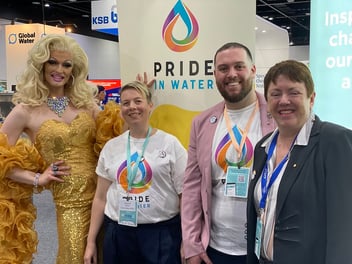Is the water sector going backwards on diversity?

While diversity and inclusion have become a major focus for the water sector in recent years, genuine diversification of teams and thinking is an ongoing journey that requires continued conversation and drive from leadership.
Presenting at Ozwater’22 on the diversity and leadership journey, AECOM Water Business Line Director Laura Fluck said leaders within the water sector need to continue to push for diversity, or risk losing ground.
“We are starting to lose traction on this diversity focus in the water industry. Diversity and inclusion was a really big topic five years ago, everyone put their plans together and began to push for more inclusion,” Fluck said.
“But taking a look now, diversity within level-two leadership in a lot of organisations has actually gone backwards. We need to keep talking about diversity within leadership and challenging ourselves to do better. Because if we don’t, who will?
“We are at risk of treating diversity and inclusion as a box that gets ticked. If we don’t keep bringing diversity to the forefront, it will continue to slide in the other direction.”
Fluck said the water sector needs to keep being proactive about ensuring the inclusion of diverse people and thinking, and continue to broaden the definition of diversity, too.
“Diversity focused on gender for such a long time, but we know we need to be thinking about diversity more broadly, to include age, sexuality, culture and ethnicity, too,” she said.
“People are becoming a lot more aware of the connection between diverse teams and innovation, business performance and complex problem solving.
“All of the things that make us individuals are a business benefit and a solutions benefit. When we start to look at diversity as being about more than gender, it becomes about how we can get different points of view within our conversations.
“And we can’t do that unless we have different people contributing to those conversations.”
Meeting complex challenges
The last couple of years have been incredibly distracting – with increasing impacts of climate change, and the pandemic – but Fluck said the sector must put diversity and inclusion at the forefront of everything it does if it’s to effectively meet these challenges.
“There is now plenty of research that suggests including different perspectives in problem solving produces more innovative solutions. We can’t foster innovation if everyone on our teams is saying the same thing,” she said.
“Looking at complex problems in a general setting, if you don’t have different points of view, you will come up with the same solutions every time, and that’s not innovation.”
Fluck said age diversity is particularly crucial when it comes to meeting the challenges of climate change.
“The generational diversity piece is really important. Younger people have a very different view and expectations on what we are doing in terms of solutions, and the impacts of those solutions,” she said.
“We are all the product of our experiences, and young people are looking down the barrel of a lot of legacy issues. We need to be listening to the younger generation about their priorities, rather than continuing to tend to our own.”
Further, nurturing diverse teams is also about understanding diverse communities, and how different communities are uniquely impacted by climate change.
“Generally, climate change impacts different communities differently. Often, lower socio-economic communities are impacted more predominantly,” Fluck said.
“If we don’t understand the experiences of all of our communities, we are likely to miss the solutions we need to meet these impacts.
“Diverse teams are crucial to ensuring we understand all of the problems that are manifesting in water, not just the problems that I, or someone similar to me, might see.”
Bolstering inclusivity
Fluck said that water organisations have made many improvements in working to attract diverse talent into the sector, but there is still more to be done in supporting and retaining diversity within middle-management roles.
“We’ve focused on putting processes and initiatives in place to get more diverse people into our companies, and we set quotas, which is great,” Fluck said.
“But middle management is still a big challenge. One reason for this is that it aligns with family choices. There’s a lot of room for improvement there, and how we can approach diversity in middle management differently.
“I don’t know that there is an initiative, per se, that is going to solve this problem. It’s more about understanding people’s experience by listening closely to their stories.”
Fluck said being able to have conversations about individuals’ experiences is important to understanding how to support and include diverse staff.
“There are a lot of different reasons why people leave companies. Maybe it’s a lack of flexibility, maybe it’s continued discrimination, maybe their values have changed and they’re looking to realign the work that they do with the person they have become,” she said.
“If we don’t continue to listen to the story of people’s experiences, it is hard to unpack the problems and create working solutions.”
AECOM has made a decision to focus closely on sponsorship, Fluck said, as a means of disrupting the tendency for male-dominated workforces to promote uniform thinking.
“A lot of organisations we work with in the water sector have been put together without true diversity of thought or experience. This is not a criticism, it’s a reality,” Fluck said.
“Companies have been structured to support young men coming through the ranks successfully. We think sponsorship can help disrupt this tendency, because relationships are key to the process of people’s career progression.
“We are looking at how we can sponsor various minority groups to actively support diverse people in their careers. It’s not necessarily always about promotion, but about suggesting and encouraging the best placement of a person based on their values and specific needs.”
Interested in hearing more about AECOM’s diversity and leadership journey? Register for Ozwater’22 here.


